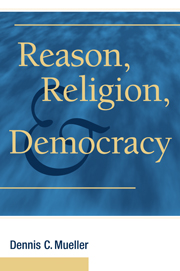Book contents
- Frontmatter
- Contents
- Preface
- 1 Liberal Democracy
- PART I FUNDAMENTALS: EVOLUTION, PSYCHOLOGY, REASONING, AND RELIGION
- PART II A HISTORICAL LOOK AT THE STATE, DEMOCRACY, AND RELIGION
- 4 The First States
- 5 Athens and Rome
- 6 The Caliphate
- 7 The Renaissance
- 8 The Enlightenment
- 9 Religion and Democracy After the French Revolution
- Epilogue to Part Two
- PART III THE INSTITUTIONS OF LIBERAL DEMOCRACY
- PART IV CHALLENGES TO LIBERAL DEMOCRACY
- References
- Author Index
- Subject Index
4 - The First States
Published online by Cambridge University Press: 05 June 2012
- Frontmatter
- Contents
- Preface
- 1 Liberal Democracy
- PART I FUNDAMENTALS: EVOLUTION, PSYCHOLOGY, REASONING, AND RELIGION
- PART II A HISTORICAL LOOK AT THE STATE, DEMOCRACY, AND RELIGION
- 4 The First States
- 5 Athens and Rome
- 6 The Caliphate
- 7 The Renaissance
- 8 The Enlightenment
- 9 Religion and Democracy After the French Revolution
- Epilogue to Part Two
- PART III THE INSTITUTIONS OF LIBERAL DEMOCRACY
- PART IV CHALLENGES TO LIBERAL DEMOCRACY
- References
- Author Index
- Subject Index
Summary
For the Lord will not forsake his people for his great name's sake; because it hath pleased the Lord to make you his people.
Moreover as for me [King Samuel], God forbid that I should sin against the Lord in ceasing to pray for you; but I will teach you the good and the right way;
Only fear the Lord, and serve him in truth with all your heart; for consider how great things he hath done for you.
But if ye shall still do wickedly; ye shall be consumed, both ye and your king.
(1 Samuel, Chapter 12)True democracies have been rare in history. Even today, when there are more countries under democratic rule than at any other time, at best half of the world's population can be said to live in democracies. Thus, it is important to understand how and why democratic states come into being, and why they are so rare. This book does not purport to be a history of the state, and so our examination of state origins will be highly selective. The goal is to highlight the conditions that give rise to democratic states and contrast them with those associated with nondemocratic ones. Those wishing a fuller historical treatment of the state are encouraged to consult the resource on which I have heavily relied – S. E. Finer's (1997) magisterial History of Government.
- Type
- Chapter
- Information
- Reason, Religion, and Democracy , pp. 79 - 92Publisher: Cambridge University PressPrint publication year: 2009

